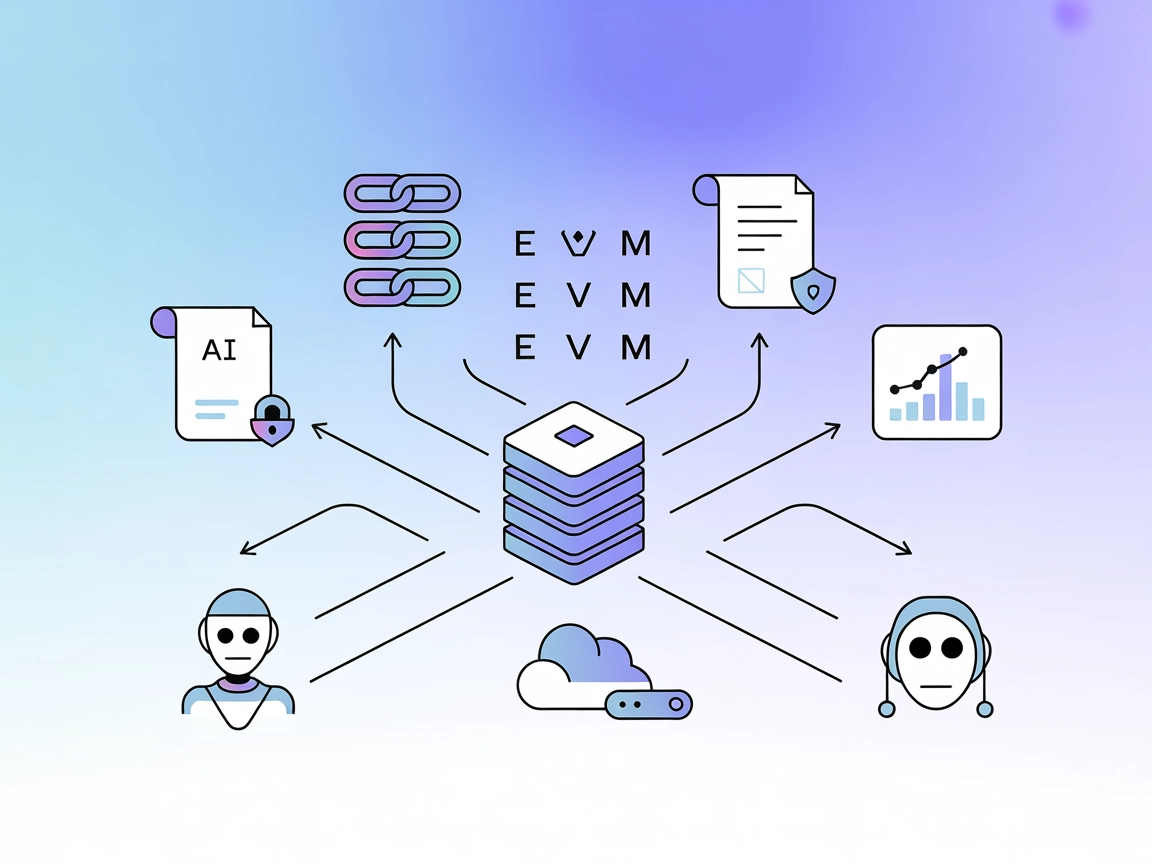
Ergo MCP Server
The Ergo MCP Server connects AI assistants to the Ergo blockchain, enabling on-chain data access, analytics, and seamless integration into AI workflows. Ideal f...

Connect AI agents and developers to any EVM-compatible blockchain using FlowHunt’s EVM MCP Server for smart contract, transaction, and analytics workflows.
FlowHunt provides an additional security layer between your internal systems and AI tools, giving you granular control over which tools are accessible from your MCP servers. MCP servers hosted in our infrastructure can be seamlessly integrated with FlowHunt's chatbot as well as popular AI platforms like ChatGPT, Claude, and various AI editors.
The EVM MCP Server is a comprehensive Model Context Protocol (MCP) server designed to provide blockchain services across multiple EVM-compatible networks. It enables AI assistants and agents to interact seamlessly with various Ethereum Virtual Machine (EVM) chains—including Ethereum, Optimism, Arbitrum, Base, Polygon, and more—using a unified interface. By exposing tools and resources for interacting with smart contracts, querying blockchain data, and managing accounts, the EVM MCP Server streamlines development workflows. It empowers AI-driven tasks such as querying chain data, managing transactions, and integrating on-chain logic, thus enhancing the capabilities of developers and AI systems working with decentralized environments.
No explicit prompt templates are mentioned in the available repository documentation or code.
No explicit resources are described in the available repository documentation or code.
No explicit tool definitions are listed in the available repository documentation or code (including server.py or equivalent).
windsurf.config.json).mcpServers section:{
"mcpServers": {
"evm-mcp": {
"command": "npx",
"args": ["@evm/mcp-server@latest"]
}
}
}
{
"mcpServers": {
"evm-mcp": {
"command": "npx",
"args": ["@evm/mcp-server@latest"]
}
}
}
mcpServers section:{
"mcpServers": {
"evm-mcp": {
"command": "npx",
"args": ["@evm/mcp-server@latest"]
}
}
}
{
"mcpServers": {
"evm-mcp": {
"command": "npx",
"args": ["@evm/mcp-server@latest"]
}
}
}
env property:{
"mcpServers": {
"evm-mcp": {
"command": "npx",
"args": ["@evm/mcp-server@latest"],
"env": {
"EVM_API_KEY": "your-api-key"
},
"inputs": {
"network": "mainnet"
}
}
}
}
Using MCP in FlowHunt
To integrate MCP servers into your FlowHunt workflow, start by adding the MCP component to your flow and connecting it to your AI agent:

Click on the MCP component to open the configuration panel. In the system MCP configuration section, insert your MCP server details using this JSON format:
{
"evm-mcp": {
"transport": "streamable_http",
"url": "https://yourmcpserver.example/pathtothemcp/url"
}
}
Once configured, the AI agent is now able to use this MCP as a tool with access to all its functions and capabilities. Remember to change “evm-mcp” to whatever the actual name of your MCP server is and replace the URL with your own MCP server URL.
| Section | Availability | Details/Notes |
|---|---|---|
| Overview | ✅ | Overview and features are described |
| List of Prompts | ⛔ | No prompt templates mentioned |
| List of Resources | ⛔ | No explicit resources listed |
| List of Tools | ⛔ | No explicit tools listed |
| Securing API Keys | ✅ | Example provided for using environment variables |
| Sampling Support (less important in evaluation) | ⛔ | No mention of sampling |
My overall rating for EVM MCP Server based on the above tables is 4/10. While the server clearly targets a useful and in-demand capability (EVM blockchain integration), the public documentation lacks details on prompts, resources, and explicit tool interfaces, limiting immediate utility for some users.
| Has a LICENSE | ✅ (MIT) |
|---|---|
| Has at least one tool | ⛔ |
| Number of Forks | 58 |
| Number of Stars | 273 |
The EVM MCP Server is a Model Context Protocol server that provides blockchain services across EVM-compatible networks. It enables developers and AI agents to interact with EVM chains via a unified interface for smart contract operations, blockchain querying, and transaction management.
Yes, the EVM MCP Server is designed for multi-chain support, including Ethereum, Optimism, Arbitrum, Base, Polygon, and other EVM-compatible networks.
Key use cases include: multi-chain blockchain querying, smart contract interaction, transaction management, and AI-driven on-chain analytics for DeFi, NFT, or DAO applications.
Store your sensitive keys in environment variables and reference them in your configuration under the 'env' property. This approach keeps your secrets secure and out of version control.
Add the MCP component to your flow in FlowHunt, then configure the EVM MCP Server using the provided JSON snippet in the system MCP configuration panel. This connects your AI agent to EVM blockchain capabilities.
Integrate blockchain data and smart contract logic into your AI workflows. Get started with FlowHunt’s EVM MCP Server for seamless, multi-chain development.

The Ergo MCP Server connects AI assistants to the Ergo blockchain, enabling on-chain data access, analytics, and seamless integration into AI workflows. Ideal f...

The Model Context Protocol (MCP) Server bridges AI assistants with external data sources, APIs, and services, enabling streamlined integration of complex workfl...

The Starknet MCP Server connects large language models (LLMs) to the Starknet blockchain, enabling AI assistants to query, analyze, and manage blockchain data a...
Cookie Consent
We use cookies to enhance your browsing experience and analyze our traffic. See our privacy policy.